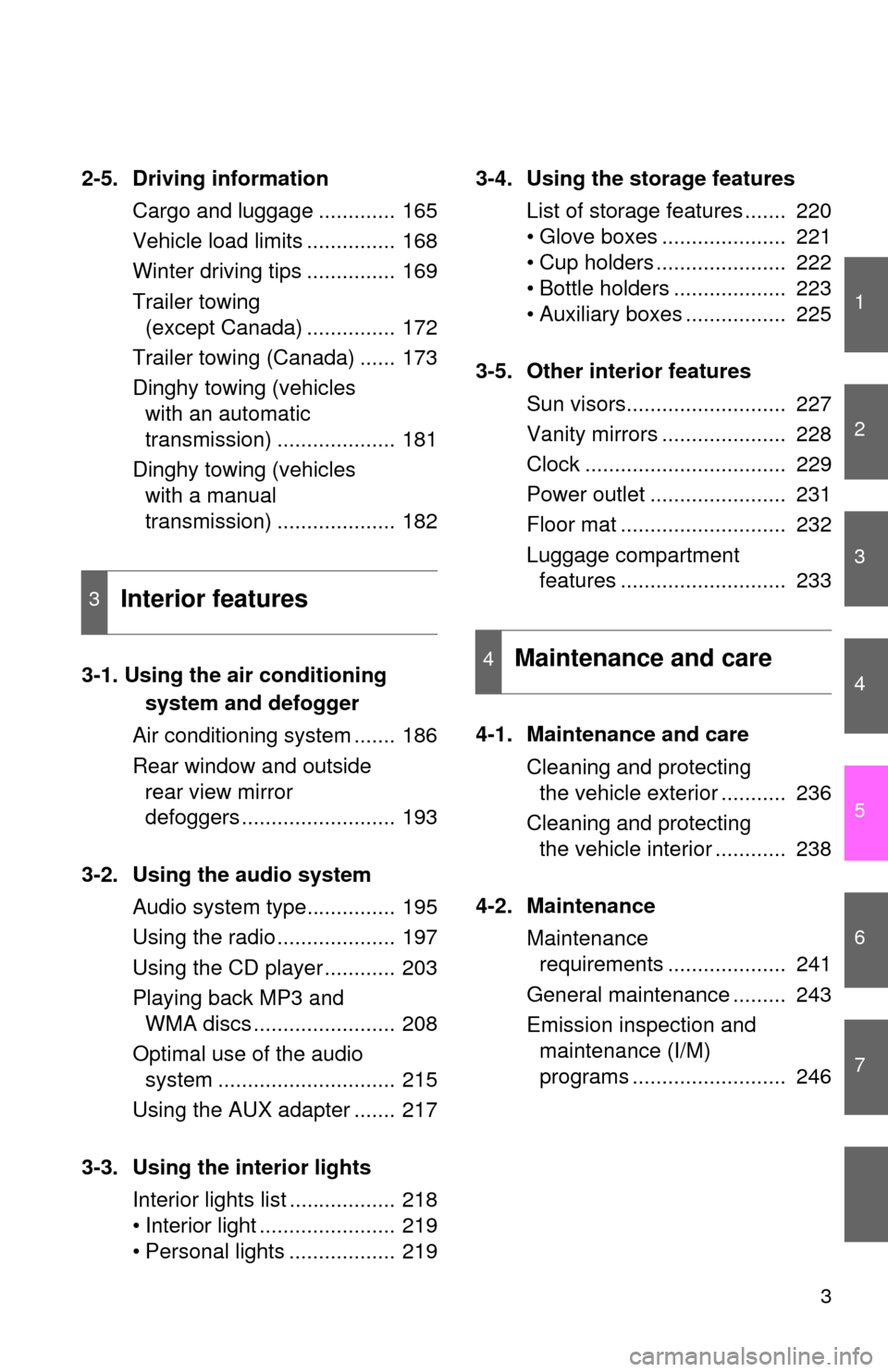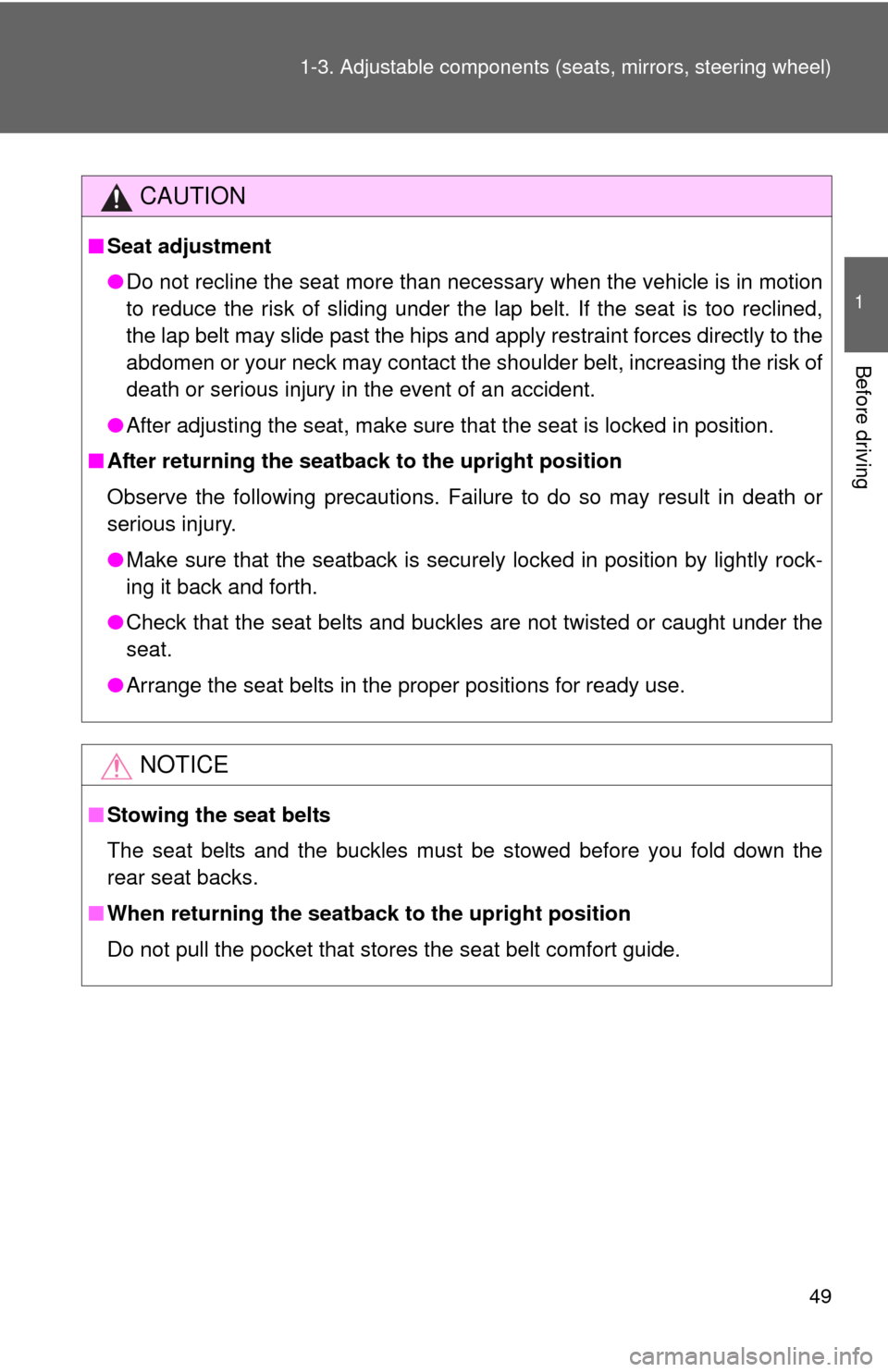Page 1 of 400
TABLE OF CONTENTS
1
1Before drivingAdjusting and operating features such as door locks,
mirrors, and steering column.
2When drivingDriving, stopping and safe-driving information.
3Interior
featuresAir conditioning and audio systems, as well as other in-
terior features for a comfortable driving experience.
4Maintenance
and careCleaning and protecting your vehicle, performing do-it-
yourself maintenance, and maintenance information.
5When trouble
arisesWhat to do if the vehicle needs to be towed, gets a flat
tire, or is involved in an accident.
6Vehicle
specificationsDetailed vehicle information.
7For ownersReporting safety defects for U.S. owners and seat belt
instructions for Canadian owners
IndexAlphabetical listing of information contained in this
manual.
Page 3 of 400

1
2
3
4
5
6
7
3
2-5. Driving information
Cargo and luggage ............. 165
Vehicle load limits ............... 168
Winter driving tips ............... 169
Trailer towing
(except Canada) ............... 172
Trailer towing (Canada) ...... 173
Dinghy towing (vehicles
with an automatic
transmission) .................... 181
Dinghy towing (vehicles
with a manual
transmission) .................... 182
3-1. Using the air conditioning
system and defogger
Air conditioning system ....... 186
Rear window and outside
rear view mirror
defoggers .......................... 193
3-2. Using the audio system
Audio system type............... 195
Using the radio .................... 197
Using the CD player ............ 203
Playing back MP3 and
WMA discs ........................ 208
Optimal use of the audio
system .............................. 215
Using the AUX adapter ....... 217
3-3. Using the interior lights
Interior lights list .................. 218
• Interior light ....................... 219
• Personal lights .................. 2193-4. Using the storage features
List of storage features ....... 220
• Glove boxes ..................... 221
• Cup holders ...................... 222
• Bottle holders ................... 223
• Auxiliary boxes ................. 225
3-5. Other interior features
Sun visors........................... 227
Vanity mirrors ..................... 228
Clock .................................. 229
Power outlet ....................... 231
Floor mat ............................ 232
Luggage compartment
features ............................ 233
4-1. Maintenance and care
Cleaning and protecting
the vehicle exterior ........... 236
Cleaning and protecting
the vehicle interior ............ 238
4-2. Maintenance
Maintenance
requirements .................... 241
General maintenance ......... 243
Emission inspection and
maintenance (I/M)
programs .......................... 246
3Interior features
4Maintenance and care
Page 4 of 400

TABLE OF CONTENTSIndex
4
4-3. Do-it-yourself maintenance
Do-it-yourself service
precautions ...................... 247
Hood................................... 250
Positioning a floor jack ....... 251
Engine compartment .......... 253
Tires ................................... 266
Tire inflation pressure......... 272
Wheels ............................... 276
Air conditioning filter ........... 278
Key battery ......................... 281
Checking and replacing
fuses ................................ 283
Light bulbs .......................... 294
5-1. Essential information
Emergency flashers ........... 304
If your vehicle needs to be
towed ............................... 305
If you think something is
wrong ............................... 311
Fuel pump shut off
system .............................. 312
Event data recorder............ 3135-2. Steps to take in an emergency
If a warning light turns on
or a warning buzzer
sounds... ........................... 315
If you have a flat tire ........... 325
If the engine will not start .... 337
If the shift lever cannot be
shifted from P ................... 339
If you lose your keys ........... 340
If the vehicle battery is
discharged ........................ 341
If your vehicle overheats..... 345
If the vehicle becomes
stuck ................................. 348
If your vehicle has to be
stopped in an
emergency........................ 350
6-1. Specifications
Maintenance data
(fuel, oil level, etc.) ........... 352
Fuel information .................. 361
Tire information................... 364
6-2. Customization
Customizable features ........ 377
Items to initialize ................. 379
5When trouble arises
6Vehicle specifications
Page 29 of 400
29 1-2. Opening, closing and locking the doors
1
Before driving
■Conditions affecting operation
The wireless remote control function may not operate normally in the follow-
ing situations.
●Near a TV tower, radio station, electric power plant, airport, gas station or
other facility that generates strong radio waves
●When carrying a portable radio, cellular phone or other wireless commu-
nication device
●When multiple wireless keys are in the vicinity
●When the wireless key has come into contact with, or is covered by a
metallic object
●When a wireless key (that emits radio waves) is being used nearby
●When the wireless key has been left near an electrical appliance such as
a personal computer
■Customization that can be configured at Toyota dealer
Settings (e.g. wireless remote control system) can be changed.
(Customizable features P. 377)
Page 45 of 400
45 1-3. Adjustable components (seats, mirrors, steering wheel)
1
Before driving
Folding down rear seatbacks
■Before folding down rear seatbacks
Insert the key into the hole on
the center seat belt buckle to
release tab (with hooked end),
and allow the belt to retract.
Stow the seat belt tabs in the
cover set in the roof as shown.
Page 49 of 400

49 1-3. Adjustable components (seats, mirrors, steering wheel)
1
Before driving
CAUTION
■Seat adjustment
●Do not recline the seat more than necessary when the vehicle is in motion
to reduce the risk of sliding under the lap belt. If the seat is too reclined,
the lap belt may slide past the hips and apply restraint forces directly to the
abdomen or your neck may contact the shoulder belt, increasing the risk of
death or serious injury in the event of an accident.
●After adjusting the seat, make sure that the seat is locked in position.
■After returning the seatback to the upright position
Observe the following precautions. Failure to do so may result in death or
serious injury.
●Make sure that the seatback is securely locked in position by lightly rock-
ing it back and forth.
●Check that the seat belts and buckles are not twisted or caught under the
seat.
●Arrange the seat belts in the proper positions for ready use.
NOTICE
■Stowing the seat belts
The seat belts and the buckles must be stowed before you fold down the
rear seat backs.
■When returning the seatback to the upright position
Do not pull the pocket that stores the seat belt comfort guide.
Page 54 of 400
54 1-3. Adjustable components (seats, mirrors, steering wheel)
Rear seats (split rear seats: type A)
Rear seats (split rear seats: type B)
Rear seats (non-split rear seat)
■Adjusting the height of the head restraints
■Adjusting the rear seat head restraints
Always raise the head restraint one level from the stowed position when
using.
Align the head restraint with the installa-
tion holes and push it down to the lock
position.
Press and hold the lock release button
when lowering the head restraint.
Align the head restraint with the installa-
tion holes and push it down to the lock
position.
Press and hold the lock release button
when lowering the head restraint.
Align the head restraint with the installa-
tion holes and push it down to the lock
position.
Press and hold the lock release button
when lowering the head restraint.
Make sure that the head restraints are
adjusted so that the center of the head
restraint is closest to the top of your ears.
Page 58 of 400
58 1-3. Adjustable components (seats, mirrors, steering wheel)
■Release method
The belt can be completely released when not required, such as
when folding down the rear seat.
To release the hooked end tab,
insert the vehicle’s key into the
hole on the buckle.
Stow the seat belt tabs in the
cover set in the roof as shown.